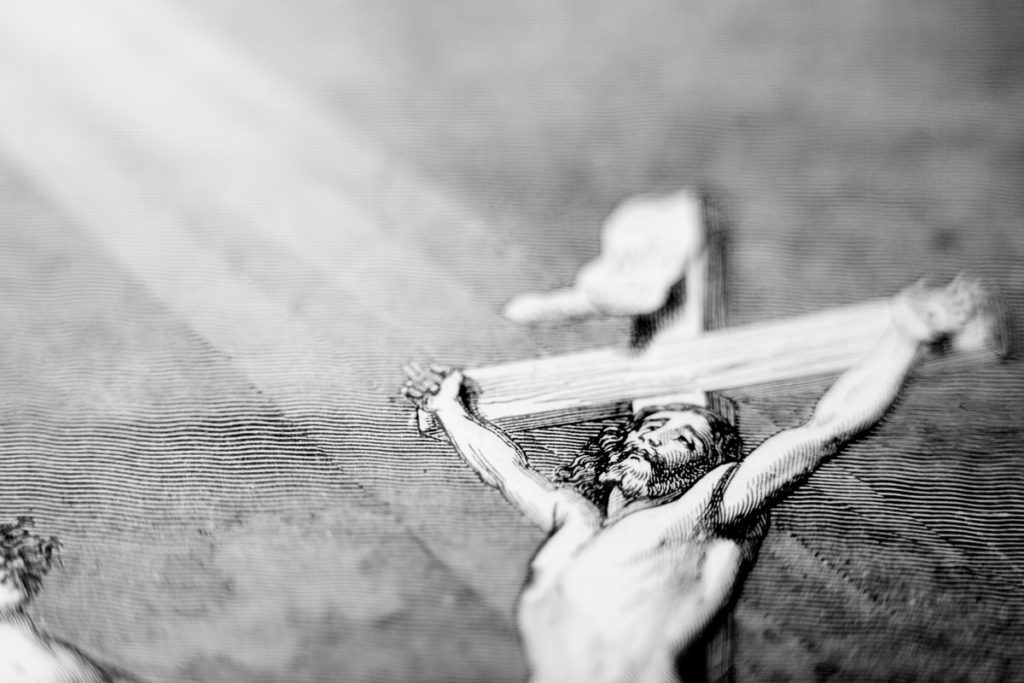“Later, knowing that all was now completed, and so that the Scripture would be fulfilled, Jesus said, ‘I am thirsty.’ A jar of wine vinegar was there, so they soaked a sponge in it, put the sponge on a hyssop plant, and lifted it to Jesus’ lips. When he had received the drink, Jesus said ‘It is finished.” With that he bowed his head and gave up his spirit.” John 19:28-30 (NIV)
Jesus died with the cry of victory on his lips. It was not the moan of the defeated, nor was it the sigh of patient resignation. It is the triumphant recognition that he has now fully accomplished the work that he came to do, in a word that means literally “it is and will forever remain finished”! But what is finished? Certainly not the grim process of crucifixion. He is still on the cross. The soldiers still have their duty to break the legs of those who are lingering—or in Jesus’ case, to pierce his heart with a spear…to take him down from the cross and to lay him in that darkness of a stone clod tomb.
But amid the unimaginable horror of the physical and mental torture, and the spiritual horror of separation from the Father while the hordes of hell descend upon him in a globe encompassing darkness as he bears the sins of the entire world, for all time, John says Jesus retains control. “Knowing that all was now completed…,” Jesus is conscious that his suffering is fulfilling the Father’s plan and bringing it to triumphant conclusion. It is no accident that the verb for “completed” in v. 28 is the identical verb (tetelestai) Jesus cries in v.30 “It is finished.”
But what has Jesus accomplished, what has Jesus finished in this moment, and forever?
We will spend a lifetime plumbing the depths of the mystery of the Cross of Jesus Christ, and eternity singing praises for the Cross of Jesus Christ—but for Jesus himself he has accomplished at least three things:
1. Jesus has finished His response to the Father’s will
He who considered equality with God not something to be grasped has now fully emptied himself and become obedient even unto death on the cross (Phil. 2:5-8). He who demonstrated throughout his ministry that he would only say what the Father told him to say, and do what the Father told him to do (Jn 5:19-20, 30), has left no question about his utter submission to the Father’s voice and will. Jesus proves his passion to do the Father’s will (Jn. 8:28; 12;49) by giving up his life at the Father’s command. In so doing, Jesus has given us the greatest model for living the life God has purposed for us—a life of complete obedience to the Father, in which we experience the very resurrection power of Jesus Christ himself as we share his life of obedience to the Father’s will (Phil. 3:10)
2. Jesus has finished His revealing of the Father’s heart
God foreshadows his own heart in the Old Testament lesson appointed for Good Friday, the story of Abraham’s almost-sacrifice of Isaac at God’s command. At the moment the knife is about to fall on his only son, Abraham hears the angel of the Lord cry out “Do not lay a hand on the boy. Do not do anything to him. Now I know that you fear God, because you have not withheld from me your son, your only son.” (Gen. 22:12, emphasis added). Centuries later, when all our best attempts to overcome sin had been utterly vitiated by our own rebellion against the law and the prophets, God so loved the world that he gave his only begotten Son so that whoever believes in him shall not perish but have eternal life (Jn 3:16, emphasis added). God foreshadowed his heart in the words of Abraham to Isaac, “God himself will provide the lamb for the burnt offering, my son.” (Gen. 22:8). How can the Father satisfy both the justice that judges and punishes sin, and his love for humankind all at once? Even the most spotless human being, innocent of all sin (if ever that were possible) could not stand in for you and me, for even that would be an unjust punishment of an innocent. So, God himself provides the Lamb who takes away the sins of the world. God provides Himself—in the person of Jesus Christ.
God was in Christ reconciling the world to himself (2 Cor. 5:19). “It is the father himself who takes the initiative in his love,” writes Stott, “[it is the Father who] bears the penalty of sin himself, and so dies.” On the cross, Jesus finally and decisively opens the holy love in the Father’s heart for all to see, a love in which God substitutes himself for you and me, so that we, who could never pay the penalty, may find righteousness and life forever under the shed blood of Jesus Christ.
3. Jesus has finished His redeeming of his Father’s world
Not all will respond to the gracious invitation to come under the shed blood of Jesus Christ for forgiveness of sin and life everlasting. But the grace that can redeem and save the entire world is there for the taking because Jesus has finished the Father’s plan to redeem the world. All the types and shadows of this redemptive work are now fulfilled in Jesus Christ:
“It is He who endured every kind of suffering in all those who foreshadowed Him. In Abel He was slain, in Isaac bound, in Jacob exiled, in Joseph sold, in Moses exposed to die. He was sacrificed in the Passover lamb, persecuted in David, dishonored in the prophets.” Melito of Sardis (2nd century), Easter homily (c. 165)
Jesus begins his ministry as “The Lamb who takes away the sin of the world” (Jn. 1:29) and he ends on the Cross as the perfect, spotless lamb of God without blemish or broken bone (Jn. 19:33) It is no accident his death falls on the Passover. For Jesus alone is the perfect Passover lamb whom God has appointed to fulfill all righteousness, righteously righteousing unrighteous people like you and me. As we rightly pray in the Great Thanksgiving at Holy Communion, Jesus is the full perfect and sufficient sacrifice, oblation and satisfaction for the sins of the whole world. In this very moment when he cries “It is finished” and surrenders to the breakers of death, the curtain of the Temple was torn in two, from top to bottom (Mk. 15:37-38), opening the Holy of Holies to the light of day. All the shadows of second-hand religion are eviscerated as the light streams in, manifesting in the moment of his death a new access to the Father himself for all who put their trust in Christ and his death on the Cross for our sins.
And for this very reason, “there is no longer any sacrifice for sin.” (Heb. 10:18)
You see, Good Friday means that there is nothing you and I can ever add to the finished work of Jesus Christ. We simply trust in his obedience to the Father, his final revealing of the Father’s heart, and his final sacrifice, redeeming the Fathers world, our world.
Good Friday means that every morning when you and I rise, there is a cross beneath which we can stand and bring every failure, every hope, every disappointment, every sin and find a fresh start into a life abundant that will never end, because Jesus did it all. It is finished.
The Rev. Canon Phil Ashey is President & CEO of the American Anglican Council.



